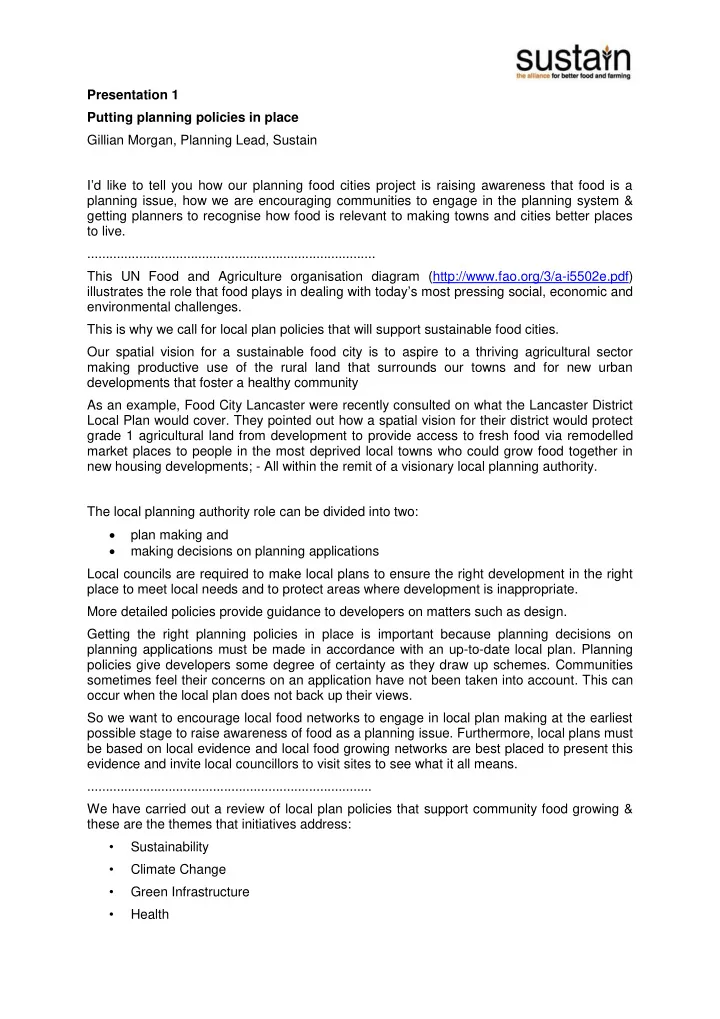

Presentation 1 Putting planning policies in place Gillian Morgan, Planning Lead, Sustain I ’ d like to tell you how our planning food cities project is raising awareness that food is a planning issue, how we are encouraging communities to engage in the planning system & getting planners to recognise how food is relevant to making towns and cities better places to live. .............................................................................. This UN Food and Agriculture organisation diagram (http://www.fao.org/3/a-i5502e.pdf) illustrates the role that food plays in dealing with today ’ s most pressing social, economic and environmental challenges. This is why we call for local plan policies that will support sustainable food cities. Our spatial vision for a sustainable food city is to aspire to a thriving agricultural sector making productive use of the rural land that surrounds our towns and for new urban developments that foster a healthy community As an example, Food City Lancaster were recently consulted on what the Lancaster District Local Plan would cover. They pointed out how a spatial vision for their district would protect grade 1 agricultural land from development to provide access to fresh food via remodelled market places to people in the most deprived local towns who could grow food together in new housing developments; - All within the remit of a visionary local planning authority. The local planning authority role can be divided into two: plan making and making decisions on planning applications Local councils are required to make local plans to ensure the right development in the right place to meet local needs and to protect areas where development is inappropriate. More detailed policies provide guidance to developers on matters such as design. Getting the right planning policies in place is important because planning decisions on planning applications must be made in accordance with an up-to-date local plan. Planning policies give developers some degree of certainty as they draw up schemes. Communities sometimes feel their concerns on an application have not been taken into account. This can occur when the local plan does not back up their views. So we want to encourage local food networks to engage in local plan making at the earliest possible stage to raise awareness of food as a planning issue. Furthermore, local plans must be based on local evidence and local food growing networks are best placed to present this evidence and invite local councillors to visit sites to see what it all means. ............................................................................. We have carried out a review of local plan policies that support community food growing & these are the themes that initiatives address: • Sustainability • Climate Change • Green Infrastructure • Health
• Economy • Regeneration • Design and Amenity There is no best place in a local plan for food growing policies because it depends on the priorities within each individual local authority area. However, we have noticed that older local plans tended to value the environmental value of supporting food growing such as addressing climate change impacts whereas more recent local plans emphasise public health. ....................................................................... In 2014 the National Planning Policy Framework for England was revised and its accompanying guidance linked the creation of healthy communities with food growing. All local plans must be consistent with the National Framework, so this is a very helpful statement for community growers. .......................................................................... If a local planning authority want to elaborate on its policies it can prepare supplementary planning documents. The district of Blackburn with darwin in Lancashire decided it needed clarity on the interpretation of their health policies. In collaboration with Sustainable Food partnership in Lancashire they included a whole section on local food growing as well as an innovative approach to hot food takeaways. ............................................................................ There is no getting around the complicated nature of local plan making. After all, it affects landowners and the value of their land, so it is a legal process. Our online toolkit aims to demystify the process and we are continuously updating it with experiences of Sustainable food cities. https://www.sustainweb.org/planning/ Just recently community food grower s in Redbridge London Borough, “Audacious Veg”, were concerned at the wording of some draft policies. Even though the plan was at a late stage they achieved some improvements. In its reply to their submissions, the council stated that it is, “fully committed to protecting, improving and increasing land used for sustainable food growing and gardening.” This is a very welcome public statement of support which will help local growers in their relations with the council there. So, although it is better to engage at the earliest stage of plan making, it is never too late to raise awareness of the local food growing activity. Our publication for planners was written following a workshop with policy planners and aims to provide confidence that food growing is indeed a planning issue. https://www.sustainweb.org/publications/planning_sustainable_cities/ .................................................................................. Every sustainable food city will have its own priorities. It might be for retail planning policies to improve access to healthy food especially in food desserts. or the major new housing developments could be encouraged to include suitable greenspace for community gardens as part of the overall design.
Every large scheme has to have a landscape plan, landscape architects have got used to designing for biodiversity, why not include food plants for people? and think about the land on the urban fringe and how this could be used for supplying local fresh food. The sustainable food partnership in Lancaster is considering the proposal for a so called garden village to be built as a large urban extension outside Lancaster city. They all got together one day to think what the new garden village should look like. If you take an imaginary walk around the streets of the future, how will you know your place is a good food town?
Recommend
More recommend